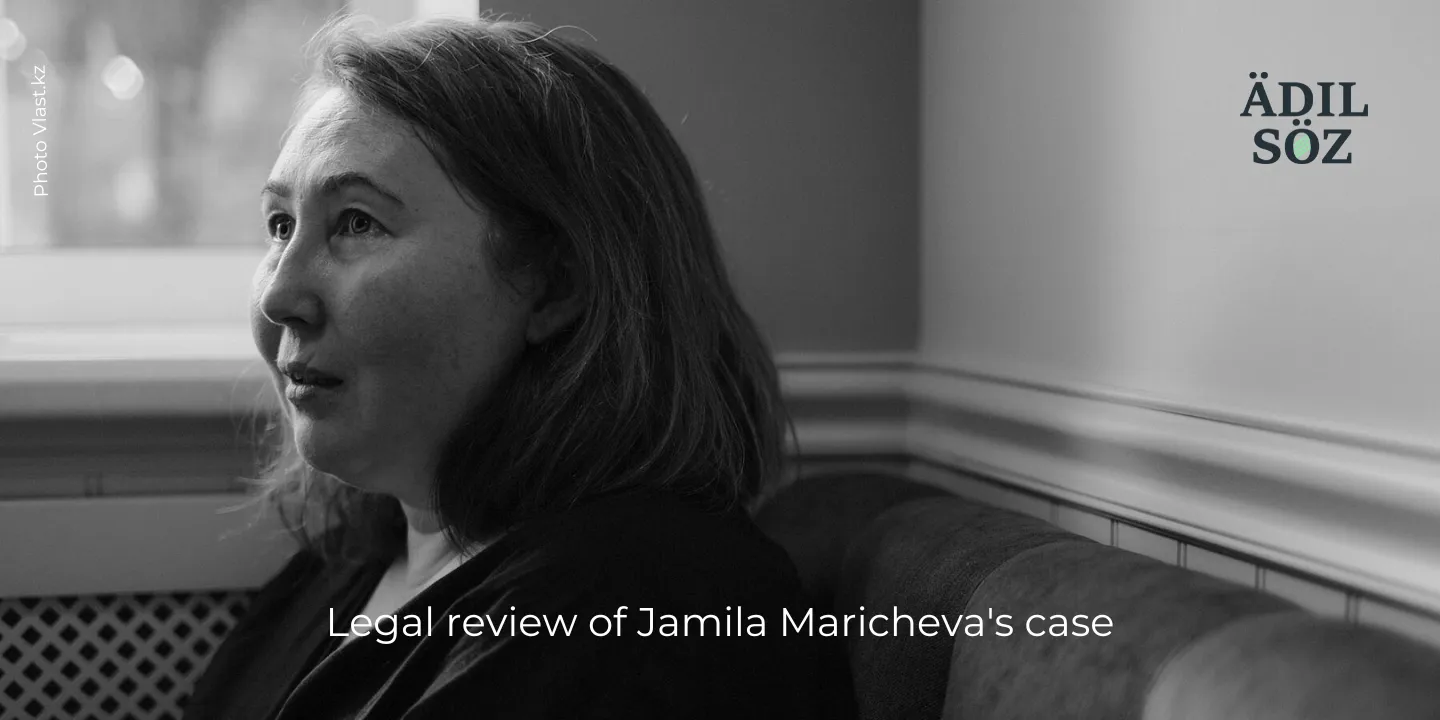Can a post in defense of colleagues be socially dangerous? Legal review of Jamila Maricheva's case

The International Foundation for the Protection of Freedom of Speech “Adil Soz” has prepared this legal review to enhance the legal practice of the Republic of Kazakhstan regarding the application of Article 456-2 of the Administrative Code.
To be held accountable under Article 456-2 of the Administrative Code, the court must establish that the disseminated information is false. Opinions (value judgments, questions, comparisons, assumptions, versions, etc.) cannot be classified as false information since they are not subject to verification for compliance with reality.
Furthermore, individuals can only be held accountable under Article 456-2 of the Administrative Code for posting and distributing false information that creates conditions for the violation of:
• Public order,
• The rights and legitimate interests of citizens or organizations,
• Legally protected interests of society or the state.
Case of Jamila Maricheva
On May 13, the court found Jamila Maricheva, a journalist and founder of the ProTenge project, guilty of spreading false information for a post she published on January 30. In this post, the journalist expressed support for colleagues from Radio Azattyk who faced problems obtaining accreditation. The court ruling does not establish how this message violates public order, the rights and legitimate interests of citizens or organizations, or the legally protected interests of society or the state. According to the law, only in the presence of such criteria can a citizen be held accountable under Article 456-2 of the Administrative Code.
In accordance with Article 19 of the International Covenant on Civil and Political Rights, ratified by the Republic of Kazakhstan, everyone has the right to freedom of expression.
According to Paragraph 17 of the Normative Resolution of the Supreme Court of November 27, 2015, No. 7 "On the application by courts of legislation on compensation for moral damage," the defendant is not responsible for value judgments in these categories of cases.
If there is a dispute, the court engages a philologist or appoints a linguistic expert. In Maricheva's case, the court unreasonably refused to appoint the specified examination to the defender, while any doubts about guilt in accordance with Part 3 of Article 10 of the Administrative Code should be interpreted in favor of the person against whom an administrative offense case was initiated.
It should be also noted that individuals may be held liable under Article 456-2 of the Administrative Code for posting and distributing not any false information, but only that which creates conditions for the violation of:
• Public order,
• The rights and legitimate interests of citizens or organizations,
• Legally protected interests of society or the state.
Based on the court's decision, which is publicly available, there are no conditions in the Maricheva case for violating the rights and legitimate interests of citizens or organizations, since there are no victims. Also, the court did not establish the creation of conditions for the violation of public order or the legally protected interests of society or the state.
Thus, Maricheva's actions do not constitute an administrative offense under Part 3 of Article 456-2 of the Administrative Code, as the court did not establish the mandatory criteria for the public danger of the disseminated false information.
Recommendations by "Adil Soz"
Internal affairs bodies and courts conducting proceedings in cases of administrative offenses provided for in Article 456-2 of the Administrative Code (Posting, dissemination of false information) should consider that a person is not liable for any false information.
Firstly, false information should be disseminated in the form of a statement of fact, not an opinion, value judgment, question, comparison, assumption, etc., which, if disputed, is determined by the conclusion of a specialist or expert in the field of philology.
Secondly, prosecution is possible only for the dissemination of false information that creates conditions for violating public order, the rights and legitimate interests of citizens or organizations, and the legally protected interests of society or the state. If these circumstances are not established, the composition of an administrative offense under Article 456-2 of the Administrative Code is absent, and the case is subject to termination.





